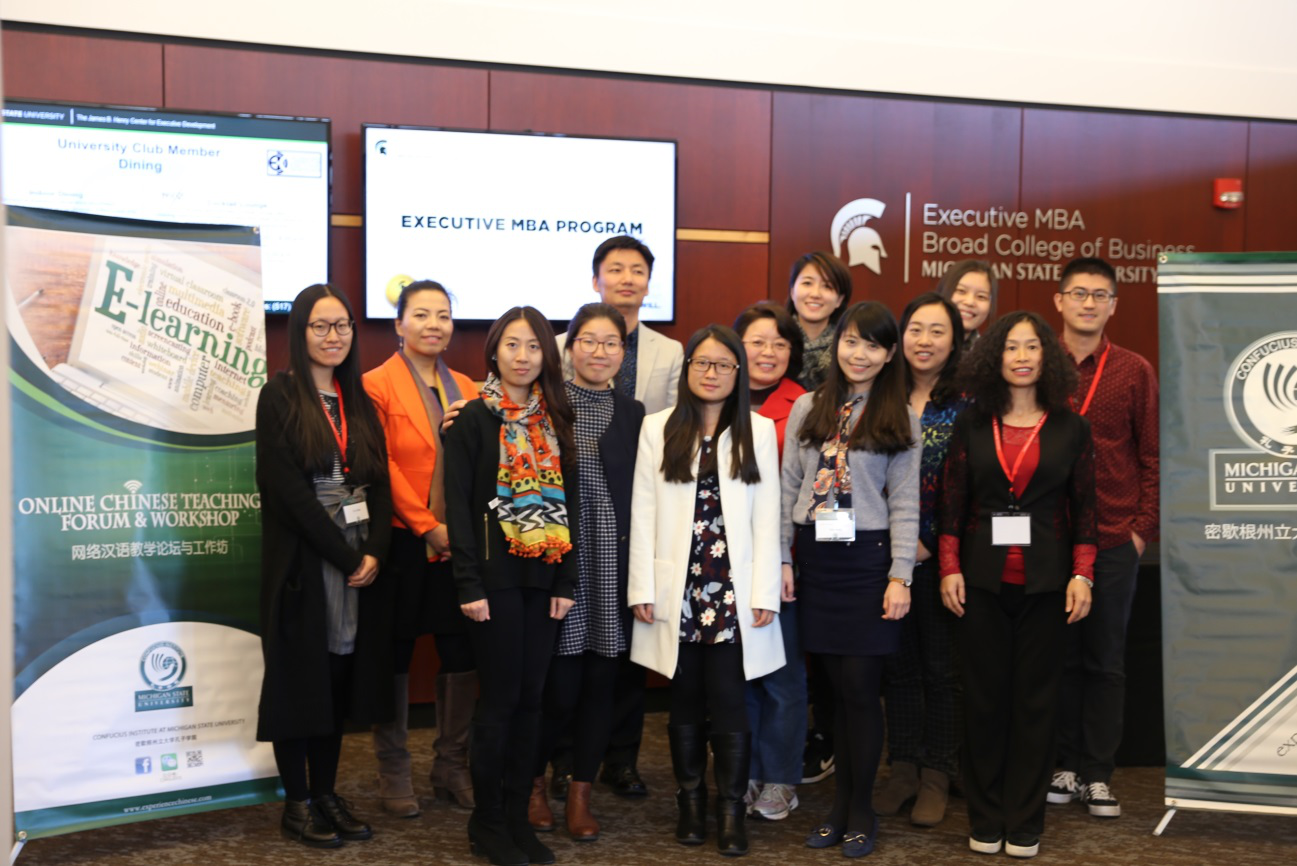 Editor’s Note: In July, 2012, the Open University of China (OUC) was inaugurated on the basis of the China Central Radio and Television University. For 5 years, the OUC has always been adhering to its unique mission and has made active explorations around the "1314 projects" and new contributions to promote equality in learning and the formation of a society for all people to learn and lifelong learning, which has won wide recognition from the society.
Editor’s Note: In July, 2012, the Open University of China (OUC) was inaugurated on the basis of the China Central Radio and Television University. For 5 years, the OUC has always been adhering to its unique mission and has made active explorations around the "1314 projects" and new contributions to promote equality in learning and the formation of a society for all people to learn and lifelong learning, which has won wide recognition from the society.
On the occasion of the 5th anniversary of the inauguration of the OUC, the OUC portal network launched a special column called OUC Stories, which is aimed at presenting the educational achievements made by the OUC in recent years from various angles and directions by means of a series of stories, so as to gather strength for and inspire OUC people to continue to move forward while recalling the original intention!
There is a department at the Open University of China (OUC) where foreign students come to take classes every month and education workers from all over the world often come to visit. This is the OUC Chinese Language Centre (CLC), staffed by a group of young, enthusiastic female teachers.
With the rapid development and opening up of the Chinese economy, the number of people around the world choosing to study Chinese is also increasing. The Confucius Institute is the main institution engaged in the international promotion of Chinese language and Chinese culture. By 2016, China had established 500 Confucius Institutes and 1,000 Confucius classrooms around the world. The number of people learning Chinese has reached 1.9 million and there are 44,000 full-time and part-time Chinese and foreign instructors teaching the Chinese Language. The OUC’s CLC has also undertaken an important role in this glorious mission by cooperating with the Confucius Institute at Michigan State University of the United States to operate an online Confucius Institute, which has produced a number of interesting TV programmes for the Chinese Language Educational Channel on the SCOLA Ⅲ TV network. It has sent Chinese instructors to overseas institutions including Michigan State University, the Confucius Institute at Western Kentucky University, and Victor Learning Centre (a Chinese language school) in Indonesia, and has received foreign students from countries including South Korea, Japan, and Kazakhstan. In addition, the CLC continues to strengthen its relations with Africa, central Asia, and other countries, actively developing overseas study centres, and carrying out teacher training in Indonesia and Chinese language training in Pakistan and other countries.
The core characters of this mission are the teachers. So far, the CLC has sent nine teachers to the United States, six to Indonesia, one to Chile, and one to Hungary. They are all equipped with solid professional knowledge, have a cheerful and lively personality, and are full of passion and ideas. They have devoted themselves to their career and are helping to write a new chapter in the story of the promotion of Chinese language and culture in different corners of the world.
Chinese jasmine blossoms in Hungary
Niu Zhinan has been a Chinese teacher at the Confucius Institute at Eötvös Loránd Universityof Hungary since 2014. She not only teaches an adult class and a Chinese language interest class for middle school students, but also teaches a Chinese language interest lesson for freshmen in the Department of Chinese Language at Lorand University. This variety of students has created a very heavy workload for Ms. Niu. The students in the adult class come from all areas of society and each have different learning motivations and demands, all aside from their different personalities. Ms. Niu plans teaching topics and activities, and prepares PowerPoint presentations, extension exercises, and activity materials based on the characteristics of the adult students. She also incorporates the OUC blended teaching model into her teaching at the Confucius Institute by using the Internet to provide practical multimedia resources for students learning Chinese language and culture.
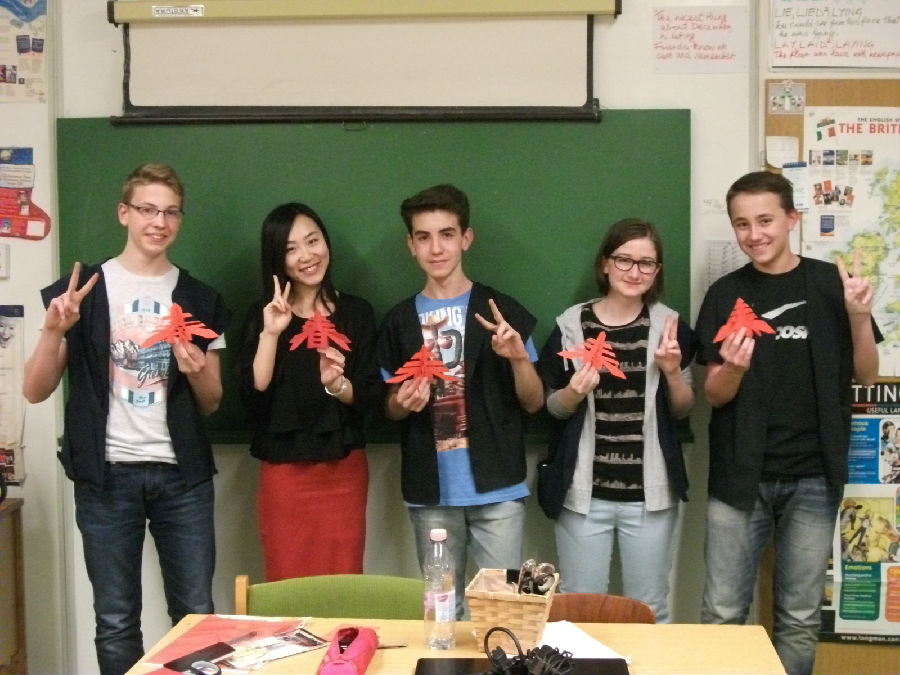
Niu Zhinan (second from left) with her students

Ms. Niu Zhinan (first from left) hosting the opening ceremony
While working in Hungary over the past three years, Ms. Niu has achieved many things, the proudest among which is that her students won first and second place in a preliminary competition in Hungary as part of a Chinese Language Contest for worldwide university students called “Chinese Language Bridge”. Li Ke and Hao Ge are two of Ms. Niu’s students at Lorand University. When they first heard about the competition, they asked Ms. Niu to coach them at the first time. Ms. Niu led them in an intensive training scheme. She adopted the tactic of “teaching in accordance with aptitude, enhancing advantages and avoiding disadvantages” based on their personalities and learning situation. Li Ke won first prize for her comedic speech, a performance that showed great self-confidence and grace, while Hao Ge ranked second, lagging only three points behind. As the result of the contest was announced, Ms. Niu and both of the students had tears in their eyes. The two students not only got the opportunity to go to Hunan province to participate in and watch the final, but also received a scholarship from the Confucius Institute to come and study in China.
After the competition, the two girls immediately rose to stardom, with various media outlets competing to interview them and take their pictures. However, the two students never forgot their teacher, telling her, "You are the best teacher we have ever met! Unfortunately, you will not be teaching us this year, but you still spent all your time helping us and lending us your clothes and cosmetics. You have taught us so much, thank you, Ms. Niu." Receiving such kind words from her students, Ms. Niu felt deeply moved.
In April 2017, the 2017 Chinese Film Festival kicked off in Budapest. Ms. Niu hosted the opening ceremony. Her natural and graceful expressions and beautiful and elegant gestures reflect the most beautiful aspects of Chinese instructors teaching Chinese. In the foreign land of Hungary, Ms. Niu is like a Chinese jasmine that blooms and spreads fragrance, affecting every student and moving every person around her.
New Silk Road, New Dream
Ms. Liu Jianing joined the CLC in 2015 and was sent to teach at the Asian International Friendship College (AIFC) in Indonesia in 2016. For over a year, she has successively undertaken the teaching courses including The Culture and National Condition of China, Writing, Business Chinese, and Psychology for sophomores at the university, as well as the Intensive Reading and Foreign Trade Chinese lessons for senior students. In addition to her regular teaching tasks, Ms. Liu also provided thesis guidance for more than 10 senior students every semester, as well as reviewing papers for dozens of students. She holds several posts simultaneously and has a very heavy work load.
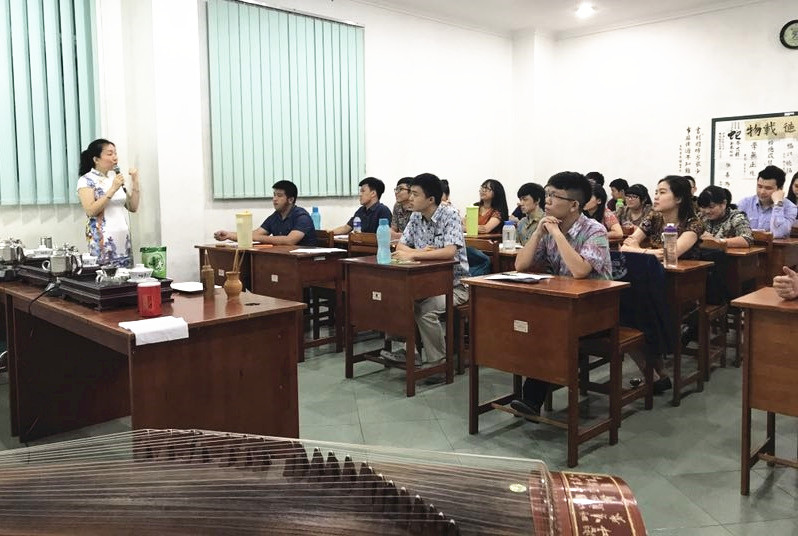
Ms. Liu Jianing (first from left) leading a class
Most undergraduates in Indonesia are part-time students, studying while working, and they come from all walks of life. It is hard for them to concentrate in class right after work. In the beginning, Ms. Liu spent a lot of time communicating with the students, became their friends, and designed lively and interesting classroom activities to promote relationship building. In the end, her hard work paid off. She not only won the friendship of her students, but also helped them achieve good learning results. The students could communicate in Chinese increasingly smoothly. When Ms. Liu finished her first year, the college and the students encouraged her to stay on at the school for another year.
Different countries, same dream
For foreign students learning Chinese, one of the most common “dreams” is to take part in the “Chinese Bridge” competition and win a prize. On 7th May 2017, the Sumatra qualification contest of the Indonesian regional “Chinese Bridge” competition, part of the sixteenth “Chinese Bridge” Competition, was held in Medan, Indonesia. Two participants from the Asian International Friendship College, Liu Tiangui and Huang Aiting, won first and third prize, respectively. Chen Jianquan and Ouyang Daisha won awards for excellence. All of them now have the opportunity to go to Jakarta to participate in the final for the Indonesia region. The person who helped the students to the stage to realise their dreams is Ms. Liu Jianing from the OUC.
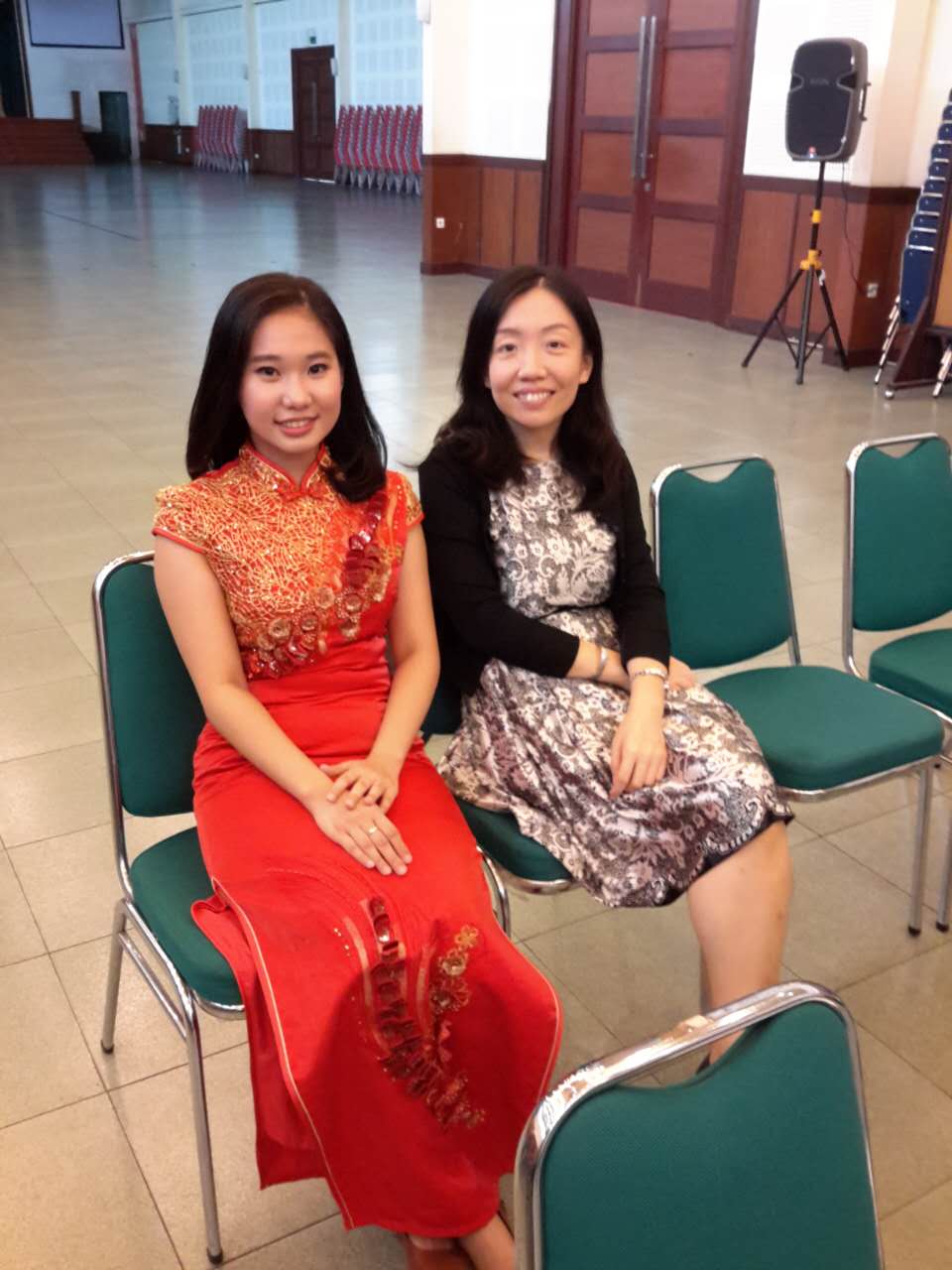
Ms. Liu Jianing and the contestants of the “Chinese Bridge” competition
Although Ms. Liu has only been in Indonesia for a short time, she has felt the attachment of Chinese living in Indonesia for their native country and their enthusiasm for learning Chinese. Ms. Liu actively participated in all kinds of local Chinese language competitions. She was repeatedly invited to be a guest judge and all of the activities were extensively covered in the local media. Liu Jianing is committed to Indonesia, a part of the 21st Maritime Silk Road, and will leave a brilliant brushstroke in the meritorious book of Chinese language teaching in Indonesia.
Distance Chinese teaching blooms in the United States
A computer, a headset, and a cable are her whole world. In this world, there is no noise like in a traditional classroom, nor can the teacher meet and interact with students. What is more, it is not always possible for the teacher to answer students’ questions face to face. Traditional teaching methods may no longer be applicable. Nevertheless, she has opened a door to Chinese language and culture for the students in this world. She is Jiang Zilu, a teacher at the Confucius Institute at Michigan State University.
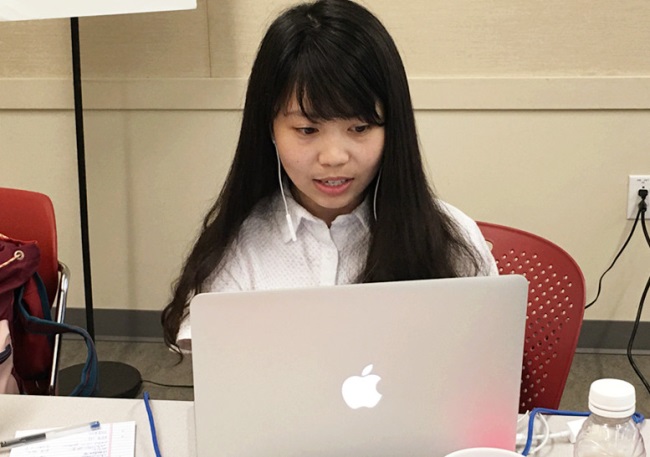
Ms. Jiang Zilu teaching a class
In the Internet age, even though communication has moved beyond the limitations of space, it still brings great challenges. Ms. Jiang found that the effectiveness of traditional teaching methods was reduced on the internet and the effect on students' learning was unsatisfactory. She said that when she first started the job, she felt that online learners were like people living on a lonely planet. In the process of her research she found that the students face a lot of obstacles. For many, online learning isn’t as interesting as learning in the classroom. Furthermore, there is a strong sense of distance between the students and tutors, and interactivity is limited, while the limited face to face instruction imposes restrictions on language output and practice for them. All in all, the students feel like network teaching cannot help them learn Chinese well. When she heard the feedback, Ms. Jiang felt very frustrated. She believes that there are no bad students. When suitable learning and teaching models are applied, online language learners can achieve the same results as traditional classroom learners. As a result, there is an urgent need to reform the teaching model.
To this end, she continued to learn language teaching methods, distance teaching theories, and learning theories. At the same time, she actively participated in California University's online teachers’ programme, and Michigan Virtual University’s mixed teaching training programme and flipped classroom programme , which laid a solid theoretical foundation for the reform of the online teaching model at Michigan State University. She is an online Chinese language teacher for multiple grades. Since 2013, she has been trying to reform the teaching design for learners at different grades. In terms of teaching methods, she introduced the flipped classroom teaching model, becoming the first person to implement the flipped teaching method in online Chinese language teaching in the Confucius Institute. She was open and innovative in her choice of teaching tools. She constantly explored the possibility of integrating scientific tools with teaching, enriched network teaching functions, and strengthened online interaction. In terms of teaching philosophy, she advocated context, significance, cooperation, and construction, and tried to help students achieve a higher level of cognition in realtime and non-realtime learning. Since 2014, she has officially promoted the "flipped" teaching model at the Confucius Institute, and joined a research group of flipped teaching as an Instructional Specialist to promote teacher training. After the experiment, the students said that “I now think that the class is very interesting”, “The present classroom design not only helps me to quickly and easily grasp basic content in non-realtime stage, but also gives me more opportunities for output and practice in realtime." "The interaction between the teacher and me makes my learning experience better." Furthermore, before the experiment one of the students was getting a C grade, but after the experiment he was getting an A. The student also said that he felt that Chinese language was no longer so difficult. However, Ms. Jiang said: "Although the current reform has been a success, there are always new patterns and new ideas to discover. I will always keep moving along this road".
Ms. Jiang not only dared to explore and innovate teaching design, but also actively developed platforms for dialogue between instructors teaching Chinese. She hoped to contribute to the communication of teaching Chinese. She published a number of conference reports and articles on how to improve online learning efficiency, online learning tools, the flipped classroom teaching model, AP online curriculum design, the use of online tools in the teaching design of Chinese language courses at the Chinese Language Association at Michigan (CLAM), Technology and Chinese Language Teaching (TCLT), and a number of Chinese teaching magazines. In addition, she also served as the Chinese language editor of an online magazine called Teaching Chinese in International Contexts (TCIC) and opened an Online Chinese Language Teaching Forum and Workshop, which attracted about 100 participants for its annual meeting. At the forum and workshop, she also shared her teaching experience and methods. She believes that dialogue and communication can spark wisdom and research can create forces for progress.

Ms. Jiang Zilu organised the Online Chinese Language Teaching Forum and Workshop
In the summer of 2016, she became one of 12 teachers on UVA STARTALK's first distance language programme in the United States through the selection of the STARTALK federal government language programme at the University of Virginia. She not only performed outstandingly in the teacher training, she also won the affection of the secondary school students in the language programme. Despite the long distances between them, they can still be happy together. At the final farewell ceremony for the distance programme, the students expressed their surprise that Ms. Jiang had removed the sense of distance in their Chinese learning, even though the language programme is based on distance education. “Ms. Jiang gave me a lot of encouragement. Although I won’t see Ms. Jiang again after tomorrow, I will still continue to learn Chinese." The local media also tracked reports about the language programme. The following picture shows Ms. Jiang's real-time class, which was a cover story on UVA Today.
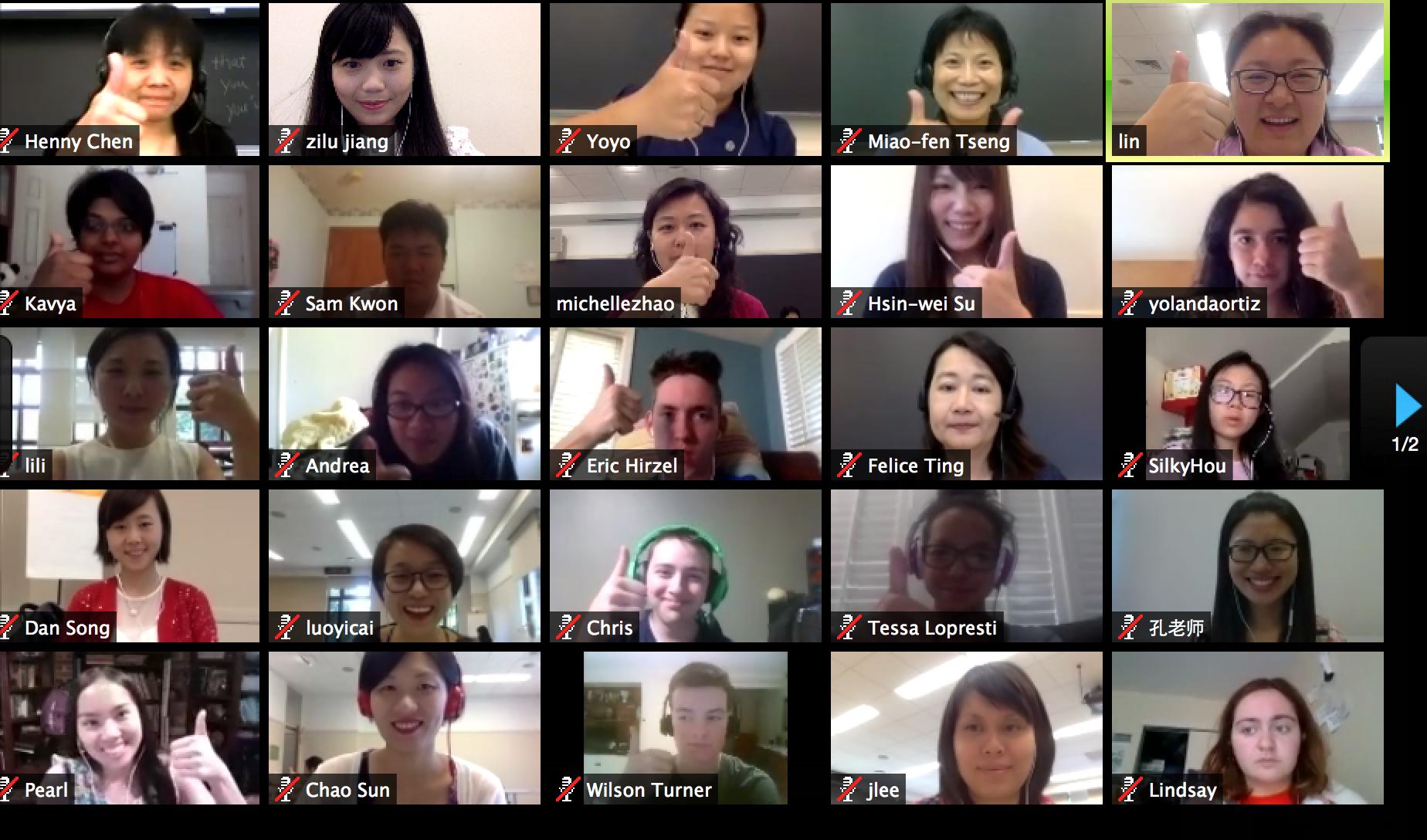
Students experience learning Chinese
In order to build a bridge for cultural communication, introduce Chinese culture to the world, and help the world learn more about China, she actively held cultural activities in the community, such as workshop for pingyin and Chinese names, Spring Festival cultural activities, tea tasting and tea culture, and Chinese language culture teaching activities in primary and middle schools. Ms. Jiang became a messenger of Chinese culture in the school and community. She promoted friendship and exchange among people from all over the world.
By Xu Xiaoxiao, Jiang Zilu, Liu Jianing, Cao Xiaoyan, Wang Shuo, OUC